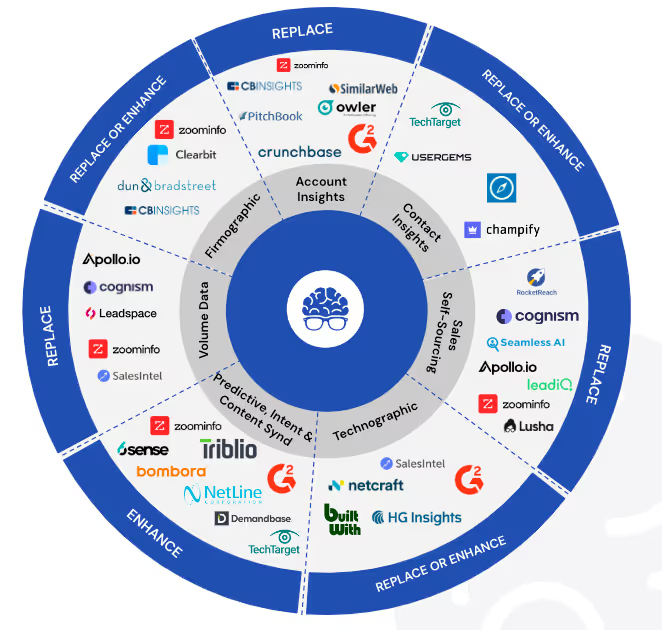You can't boil the ocean, just as you can't effectively target every small and medium-sized business (SMB) without the right insights. It's an overwhelming and impractical task without the proper tools. However, by zeroing in on specific behaviors and needs, you can make a meaningful impact. LeadGenius customers are doing just that by harnessing the power of credit card transaction data. This data provides unparalleled insights into the behaviors and needs of eCommerce, retail, and other SMBs, enabling more effective marketing strategies, optimized offerings, and accelerated growth.
Understanding Credit Card Transaction Data
Credit card transaction data encompasses detailed information collected during the purchase process using credit cards. This includes:
- Transaction Amount: The total cost of the purchase.
- Date and Time: When the transaction occurred.
- Merchant Information: Details about the business where the transaction took place.
- Product/Service Details: Information about what was bought.
- Location Data: The geographic location of the transaction, useful for identifying trends.
Why is Credit Card Transaction Data Valuable?
1. Behavioral Insights
- Spending Patterns: By analyzing how and when SMBs spend money, LeadGenius customers can uncover purchasing behaviors and preferences, enabling more targeted outreach.
- Seasonal Trends: Identifying peak spending periods helps inform the timing of marketing campaigns, ensuring messages hit at the most impactful times.
2. Customer Segmentation
- Tailored Marketing: Transaction data allows for the segmentation of SMBs based on spending habits. This enables highly personalized and relevant marketing strategies, increasing engagement and conversion rates.
- Identify High-Value Customers: Recognizing businesses with frequent or high-value transactions helps in targeting premium offers to those more likely to respond positively.
3. Competitive Analysis
- Market Share: Analyzing transaction data from competitors provides insights into market share, helping businesses understand their position in the market.
- Benchmarking: Comparing performance against industry standards allows for the identification of strengths and areas for improvement.
4. Product Development
- Demand Forecasting: Predicting which products or services are in high demand aids in inventory management and product development decisions.
- New Opportunities: Spotting market gaps based on transaction data reveals potential areas for new product or service offerings.
5. Enhanced Targeting
- Geo-Targeting: Location data focuses marketing efforts on areas with higher transaction volumes, improving the efficiency of campaigns.
- Timing Offers: Aligning promotions with periods when businesses are more likely to spend, such as end-of-month or fiscal year-end, maximizes response rates.
6. Credit Risk Assessment
- Financial Health: Assessing the financial stability of SMBs through transaction data helps in making informed credit and lending decisions.
- Fraud Detection: Identifying unusual spending patterns assists in detecting and preventing fraudulent activities.
Real-World Applications in Marketing and Sales
Lead Generation
LeadGenius customers use transaction data to identify potential new clients by finding businesses that match specific target criteria. This data-driven approach results in higher quality leads and more effective outreach.
Retention Strategies
Insights from transaction data are invaluable for developing retention programs for existing customers. Loyalty rewards, targeted discounts, and personalized offers keep customers engaged and reduce churn.
Campaign Optimization
Refining marketing campaigns based on transaction data insights increases ROI. By understanding what resonates with their audience, businesses can allocate resources more effectively and achieve better results.
Success Stories from LeadGenius Customers
- eCommerce Targeting: An online retailer used transaction data to identify SMBs with high spending patterns on digital marketing tools. By offering tailored solutions that addressed their specific needs, the retailer saw a significant increase in conversion rates and customer satisfaction.
- Retail Insights: A retail chain analyzed transaction data to understand peak shopping periods and popular products among SMB customers. This information allowed them to optimize stock levels and run targeted promotions during high-traffic times, boosting sales and reducing inventory costs.
- SMB Financing: A financial services company used transaction data to assess the creditworthiness of SMBs more accurately. This led to better lending decisions and a decrease in default rates, while also identifying opportunities for cross-selling financial products.
Conclusion
Credit card transaction data provides a wealth of information that can be leveraged to better understand and target SMBs. For LeadGenius customers, this data is a game-changer, offering actionable insights into spending behavior, customer segmentation, competitive landscape, product demand, and financial health. By utilizing these insights, businesses can create tailored marketing strategies, optimize product offerings, and drive growth, ultimately achieving a competitive edge in today's dynamic market.
The future of data lies in custom insights and bespoke solutions. LeadGenius is at the forefront of this revolution, empowering businesses with the information they need to succeed.




